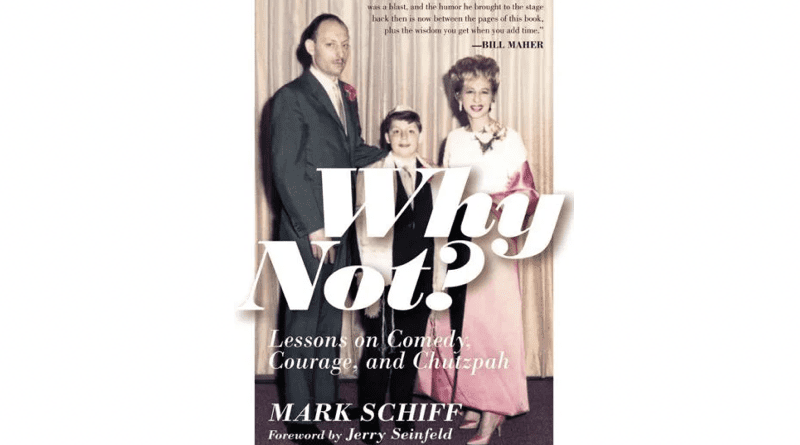Why Not? Lessons On Comedy, Courage And Chutzpah – Book Review
Mark Schiff is an American-Jewish stand-up comedian. Alone on a stage, he can keep an audience entertained, sometimes roaring with laughter, for an hour or more simply by what he says and how he says it. His innate sense of humor, allied to an enormous fund of anecdotes and observations, makes him an ideal guest, too, for TV talk show hosts. His long-time friend, fellow comedian and touring partner, Jerry Seinfeld, provides the foreword to Schiff’s new book.
In explaining how he came by the title, Schiff tells us that some years ago he was asked by the editor of a Los Angeles Jewish journal to write an article, something he had never done before. His two word response, which he equates in significance with his two-word response at his wedding (“I do”) was “Why not?” That one article led to a series, and then to this book. “I bet if you tried,” he says, “You could also locate two words that changed your life.”
Why Not? reflects the man and his profession. Just like one of his performances, the book is a wide-ranging collection of observations, some hilariously funny, some a little more serious, reflecting lessons learned over his 71 years. About aging itself, though, he cannot help being funny. “Don’t let aging get you down,” he quotes, “it’s too hard to get back up.” Because in his musings he constantly draws on personal experiences, the reader comes to learn a good deal of his history. He describes the parental battleground that soured his childhood and adolesence. “I could never figure out how and why they stayed together,” he writes, “but they did.” He moved out at 17. “If I could have, I would have left at four.”
Even closer to home is his description of living with his mother’s mental illness and his father’s inability to protect him. Subject to fits of uncontrollable rage, she would lock his father out of the house, grab a kitchen knife, point it at her own heart, look the little Mark in the eyes and say ”Please kiil me.”
“My mother was ill,” he now acknowledges, “but nobody ever said it. Maybe these days there is a pill for that. Back then, there was next to nothing.”
Despite the trauma of his childhood, he chooses to illustrate the front cover with a photograph of himself as a barmitzvah boy, standing between his parents. And in the acknowledgments page at the rear of the book, having thanked God, he turns next to his parents. “If I’m lucky,” he writes. “we wil meet again one day.”
These and other personal reminiscences, such as his 20-year battle to get on the Johnny Carson show, or his successful struggle against alcoholism, provide a sometimes painfully honest background to what is a volume packed with witty observations and bursting with Jewish humor. Prefacing a section about the Jewish love of complaining, Schiff writes: “A waiter comes over to a table of old Jewish women and says: ‘Excuse me ladies. Is anything all right?’”
Jewish religious values permeate the book, which is also replete with Yiddish words and expressions. His footnotes explaining them are a delight in themselves. In writing about a phone call from a boyhood friend one erev Rosh Hahanah, asking his forgiveness for some long forgotten slight, Schiff provides a footnote for the term teshuva. “Teshuva,” he writes, “means to repent. We recognize our own wrongdoing and then turn around and face the one we have wronged. it is regretting sin and showing remorse. Unless the person you wronged is an idiot and deserved it. But who am I to judge?”
He tells us he likes living among Jews, listing a variety of things about it that give him pleasure including “women in supermarkets wearing sheitels” and ”men in kippahs wearing tallitot.” In the short piece he titles “Gooood Shabbas”, he decries those people who fail to respond to his friend David’s greeting, quoting the scholar Shammai in Ethics of the Fathers , and the Chofetz Chaim (Rabbi Israel Meir Kagan).
Schiff cannot resist dwelling on the subject of marriage, prefacing his remarks with the old joke: “Before a man gets married he is incomplete; after he’s married, he’s finished.” Somewhere he slips in: “The fact that I got married and have stayed married is proof there is a God,” while among his acknowledgments is : “To Rabbi Joe Schames, who every time I had a question about Judaism or wives was always there to answer it.”
Readers hoping to find vignettes about Schiff’s encounters with some star names will not be disapppointed. He writes about meeting, among others, Katherine Hepburn, Christopher Reeve, Anthony Hopkins, Neil Simon, Milton Berle, and, of course, Jerry Seinfeld. The book has eight pages of photographs following Schiff through various stages of his life. The last one pictures his family at his son‘s wedding in 2022.
“Two amazing things happened on April 3, 2022,” he writes as a caption. “My youngest son, Noah, got married, and my vegan portobello mushroom dinner cost me over $50,000. Oh yeah, and another $400 for the rented tux.”
You will certainly enjoy reading Why Not?

